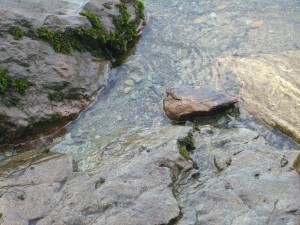Today a close friend returned to me a book on shamanism that I had lent to her some months ago. It has been years since I read it. Before I replaced it on the shelf, I leafed through it. I skimmed a section entitled, “The Healing Journey”, and as I did, I noticed, as I often do, something which has profoundly changed for me since that kenshō moment. I felt, surprisingly, distaste. What is this? I asked myself. Why do I feel this in response to a description of a healing impulse?
As I searched for an understanding of my feeling, I felt as if I were riffling through the pages of my Self; looking for a reasoned explanation within those pages. Ah! And there it was — as my husband might say, ‘a mystery wrapped in a puzzle, buried in an enigma’. I suddenly realised how everything in our lives has post-modern, judeo/christian/islamic/cartesian dualism at its centre. It suddenly struck me just how assumptive and fundamental our dualism is. It is as if we cannot view the world, except through the lens of this dualism – good v bad, black v white, right v wrong. As these thoughts seemingly ploughed through my mind, I continued to skim the Healing section in the book of shamanism. It felt like everything connected for a moment in a single question, alert, vehement: “Heal WHAT?”
My thoughts stuck there, at the point of this question. What precisely is it we need to heal, and why? I thought of my own ills, the physical ones – the intense, chronic migraine that disables me for a third of every month; the systemic lupus erythromytosis that fatigues, threatens and sometimes cripples me. Wouldn’t I want these things ‘healed’? Astonishingly, I discovered that the answer was very different to what it might have been two years ago. Yes, a part of me would like to be without these things. However, a newer, larger part of me accepts them, and is not sure that I would want to have never experienced them. Further, this piece of me is curious, wonders what learning imbedded in what experience will be offered me by continuing to bear my small sufferings. This accepting part is the post kenshō part. It feels firm and immovable. A little wisftful perhaps, in a kind of wouldn’t-it-be-nice? way. But firm. No.
I think of the wonderful people I know and their struggles with illness, accident, event, circumstance. It is not that suffering has enobled them. That very notion has a dualistic assumption at its centre. They were ignoble and are now noble. No. They were smaller and are now bigger. They were less awake and are now more awake. It is not dualistic change from one thing into its opposite. It is the change of process; of persisting in an awake way.
The distaste I felt at the Healing chapter of the shamanic book seems to have to do with a refusal to accept the dualism of ill/bad v healed/good. It feels an immense arrogance, this impulse to rush into healing anything unpleasant, uncomfortable, challenging, tragic…as if it were ‘bad’ and therefore not to be experienced; unacceptable, a threat to wholeness, a part of life to be banished. As such, it’s laughable. Life just is; we can’t accept one bit and reject some other bit.
I realise I no longer see the world this way, not because I (in my self or mySelf) have chosen a new opinion. Astonished, I have discovered I can no longer see the world this way. I know that I can still walk the walk and talk the talk of the dualistic world. But I also know, profoundly, shockingly, that I have reached for the dualistic assumptions in myself and they are no longer there.

0 comments so far
add your comment